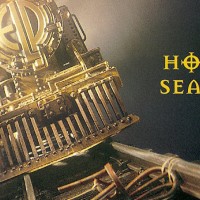Over the years, the pop-styled album Love Beach has become the most divisive thing Emerson Lake and Palmer ever did. From its mostly compact songs to its in-the-moment yacht-rock cover image, there wasn’t much about this project that seemed to fit with the band’s long-established prog aesthetic.
Keith Emerson would later attempt to rehabilitate the album’s image, calling Love Beach a “brave attempt to make a crossover.” But former bandmate Carl Palmer is having none of it. He says Love Beach arrived at a low ebb on Nov. 17, 1978, both in the sense that this instantly successful supergroup had begun to drift apart but also that their style of music had begun to fall out of favor.
The result was an album that should have never been made.
“You’re getting to the nitty gritty, where you’ve got to fight,” Palmer told ELP archivist Tony Ortiz. “And you’re getting to a situation where music is changing – and radio. Punk is coming in. It’s coming to the end of our period. We’re not getting played on the radio. The situation has changed. Now, you either stay by your guns, and keep on doing what you do, or you can buckle – and we buckled, I think.”
Of course, Emerson’s defense had its limits. There’s simply no excuse for the album art. The concept of ELP standing on a windswept dune, with tufts of chest hair poking out of their fun shirts still seems impossibly wrong-headed for a group known for its lengthy excursions into the musical netherworlds between rock and classical music.
Instead, Emerson wanted to focus on the music, which he said has been unfairly lumped in with this awful image. After all, Love Beach did conclude with one of ELP’s patented four-part side-long musical excursions, “Memoirs of an Officer and a Gentleman.” “Let’s tell you the truth: It’s not a bad album,” the late Emerson argued. “It’s just the album cover. The album cover kind of ruins it.”
Everyone in Emerson Lake and Palmer later admitted that Love Beach wouldn’t have happened in the first place, but for label pressure. They were told, in essence, to produce one more group album before any solo careers could be launched. ELP chose the title in honor of the setting for the sessions that would produce their seventh studio effort, Nassau’s Compass Point in the Bahamas. They were recording there, near the actual Love Beach, since Keith Emerson and Greg Lake both had nearby homes. It was all supposed to be so simple.
Unfortunately, Emerson said their record label pressured ELP for a cover shot to match – all of which was designed to mimic the crossover success that Yes and Genesis were having at the turn of the 1980s.
“So, the idea was that: OK, the Beatles had done Abbey Road, which was the name of the studio where they were recorded it, at Abbey Road, with the famous picture of them walking across the crossing lane and we said: ‘Alright, we will call it Love Beach,” Emerson said. “I wasn’t favorable about that. I really wasn’t favorable about that. But the record company said: ‘It was about time to show your own faces on the album cover looking happy and smiling.'”
The album arrived amid a lasting backlash. Love Beach would become the lowest-charting release of Emerson Lake and Palmer’s otherwise celebrated 1970s-era period. Even Rush’s Geddy Lee, a stalwart supporter, remains dumbfounded. “Emerson Lake and Palmer had a famously disappointing album, Love Beach,” he’d later grumble. “I was a huge ELP fan, but that one really furrowed my brow.”
The cover image became a meme for everything that had gone so very wrong. “I think it was unfortunate,” Emerson conceded, “to have the picture of us on the front cover looking like the Bee Gees.” Palmer had to agree: “I mean, it looks like the Bee Gees, doesn’t it, that cover? You look at, and you think: ‘Jesus!'” Palmer said. “It was the wrong thing to do and, I think if everyone was absolutely honest, they would say that.”
Emerson Lake and Palmer wouldn’t issue another studio album until 1992, though Emerson found he liked the Caribbean setting for Love Beach. He also recorded the 1982 solo effort Honky there.




In an Amazon UK review of Love Beach, I described the cover as “3 middle-aged sex tourists pose on a caribbean beach”. I think Carl Palmer is being quite kind in his description!
Admittedly, Love Beach was disappointing. It’s a horribly-produced album. Canario could’ve been good. And the second side (Memoirs) could’ve been good. But, again, the production is so bad.
ELP should find all every video of “All I Want Is You” and burn them.
Compared to the popular music of today it really doesn’t sound too bad,